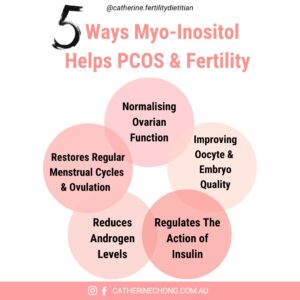The Inositol Supplement And Fertility Connection
In the world of supplements, few have demonstrated as much efficacy in managing polycystic ovarian syndrome (PCOS) as inositol. PCOS is a condition that affects a woman’s hormone levels, often leading to ovarian dysfunction, menstrual irregularity and infertility.
In this blog post, we will explore the latest research on inositol supplements for fertility, focusing on their benefits for women with PCOS.
What is Inositol?
Inositol is a naturally occurring sugar that plays a crucial role in cellular communication and hormonal signalling, particularly in insulin regulation and reproductive health. It helps balance blood sugar levels, supports ovarian function, and assists in neurotransmitter activity. Our bodies naturally produce inositol, but it is also found in foods such as fruits, legumes, grains, and nuts.
There are nine different types of inositol, but the two most significant for fertility and PCOS are Myo-inositol (MI) and D-chiro-inositol (DCI). These two forms act as insulin mediators, improving insulin sensitivity and restoring hormonal balance.
How Inositol Supplement Support Fertility in PCOS
A 2022 systematic review and meta-analysis found that inositol supplementation significantly improved key markers of fertility and metabolic health in women with PCOS. The study compared two groups—one receiving Myo-inositol (MI) alone and the other receiving a combination of MI and metformin. Both groups showed improvements in body mass index (BMI), menstrual regularity, insulin resistance, and anti-Müllerian hormone (AMH) levels. Notably, MI alone was found to be an effective alternative to metformin for women struggling with infertility due to PCOS (Sigue & Decena, 2022).
Inositol Supplement and Egg Quality
For women undergoing assisted reproductive technology (ART), inositol supplements have shown promising benefits.
A randomised trial demonstrated that inositol significantly enhanced the quality and quantity of retrieved eggs in women with PCOS undergoing ART cycles. Specifically, supplementation increased the proportion of mature oocytes essential for successful fertilisation. The study also found that inositol improved overall fertility rates and resulted in more high-quality embryos, highlighting its potential as an effective intervention for enhancing ART outcomes (Akbari Sene et al., 2019).
A 2024 study found that Myo-inositol supplementation in combination with alpha-lipoic (ALA) and N-acetylcysteine (NAC) significantly improved ovulation rates and embryo quality in PCOS women undergoing ART (Elfarjani & Choueiry, 2024).
Inositol Supplement and the Ideal Ratio
There is growing evidence that an imbalance in MI and DCI in the ovaries can impair fertility. Research suggests that an optimal 40:1 ratio of MI to DCI provides the best results for women with PCOS, helping to improve egg quality, ovulatory function, and insulin sensitivity (Fedeli et al., 2023).
Additionally, a review concluded that inositol supplementation, particularly in a 40:1 ratio of MI to DCI, enhances insulin sensitivity, regulates ovulatory cycles, and reduces androgen levels-especially for overweight patients with PCOS, ultimately improving fertility outcomes (Wojciechowska et al., 2019).
Should You Consider Inositol for Fertility?
If you are facing fertility challenges related to PCOS, inositol supplements may be a valuable addition to your reproductive health plan. With growing research supporting their role in improving insulin sensitivity, menstrual regularity, and egg quality, inositol offers a natural and well-tolerated alternative to traditional insulin-sensitising medications.
However, as with any supplement, it is crucial to consult your healthcare provider to determine the right approach for your needs.
By integrating inositol supplementation into your fertility journey, you may take an important step toward hormonal balance, optimised ovulation, and improved chances of conception.
🤔 Not Sure If You’re Taking the Right Supplements?
That’s exactly what my Express Supplement Review is for! We’ll review your health profile, lab results, and fertility goal to create a personalised supplement plan that’s safe, effective, and tailored just for you. Click here to schedule your session now.
Bottom Line
- Inositol supplementation offers hope for women with PCOS, improving metabolic health and optimising ovarian function.
- Recent studies confirm its potential benefits in regulating insulin sensitivity, restoring ovulation, and enhancing fertility outcomes.
- Consulting a fertility dietitian or healthcare provider is advised for tailored supplement guidance.

